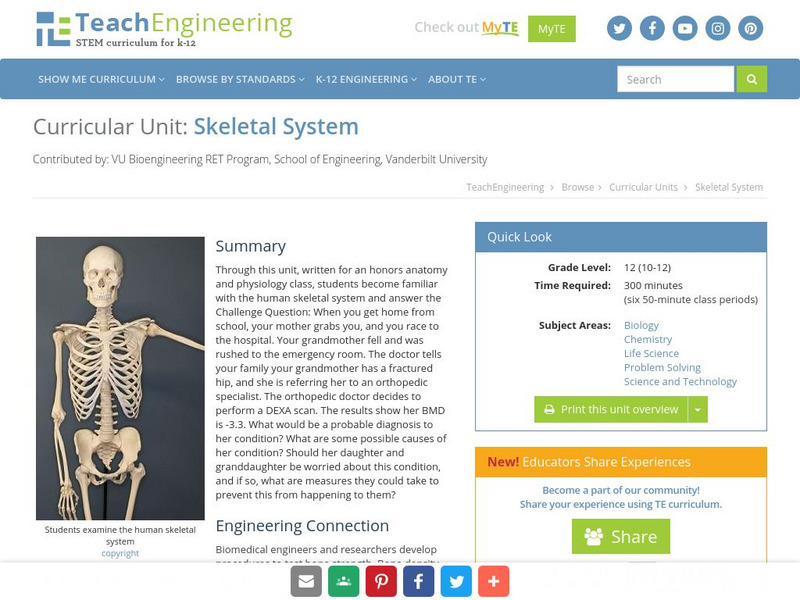Curated OER
Nuclear Magnetic Resonance
Eleven slides are used in this PowerPoint to present how nuclear magnetic resonance works and to give learners an opportunity to interpret examples of nuclear magnetic resonance spectra. Ample information is provided, so this is a...
Other
Rochester Institute of Technology: Basics of Nmr
A good overview of NMR. Some of the pictures are slow, but the explanation makes the concepts clear.
Other
Magnet Lab: The Basics of Nmr
The site is very easy to read and provides a thorough demystification of Nuclear Magnetic Resonance. Written by Dr. Joseph P. Hornak, a professor of Chemistry and Imaging Science at the Rochester Institute of Technology, the site breaks...
TeachEngineering
Teach Engineering: Skeletal System
Through this unit, written for an honors anatomy and physiology class, students become familiar with the human skeletal system and answer the Challenge Question: When you get home from school, your mother grabs you, and you race to the...
National High Magnetic Field Laboratory
Magnet Academy: Felix Bloch (1905 1983)
Physicist Felix Bloch developed a non-destructive technique for precisely observing and measuring the magnetic properties of nuclear particles. He called his technique "nuclear induction," but nuclear magnetic resonance (NMR) soon became...
National High Magnetic Field Laboratory
Magnet Academy: Paul Lauterbur
Chemist Paul Lauterbur pioneered the use of nuclear magnetic resonance (NMR) for medical imaging. He developed a technique, now known as magnetic resonance imaging (MRI), in the early 1970s that involves the introduction of gradients in...
National High Magnetic Field Laboratory
Magnet Academy: Isidor Isaac Rabi
Isidor Isaac Rabi won the Nobel Prize in Physics in 1944 for his development of a technique for measuring the magnetic characteristics of atomic nuclei. Rabi's technique was based on the resonance principle first described by Irish...
National High Magnetic Field Laboratory
Magnet Academy: Edward Purcell
Edward Mills Purcell was an American physicist who received half of the 1952 Nobel Prize for Physics for his development of a new method of ascertaining the magnetic properties of atomic nuclei. Known as nuclear magnetic resonance...
Other
Understanding the Brain: Watching the Brain in Action
Explanation of the use of functional magnetic resonance imaging (fMRI) to view the brain in action.
Khan Academy
Khan Academy: Proton Nuclear Magnetic Resonance Questions
This is a ten-question quiz pertaining to proton nuclear magnetic resonance.











